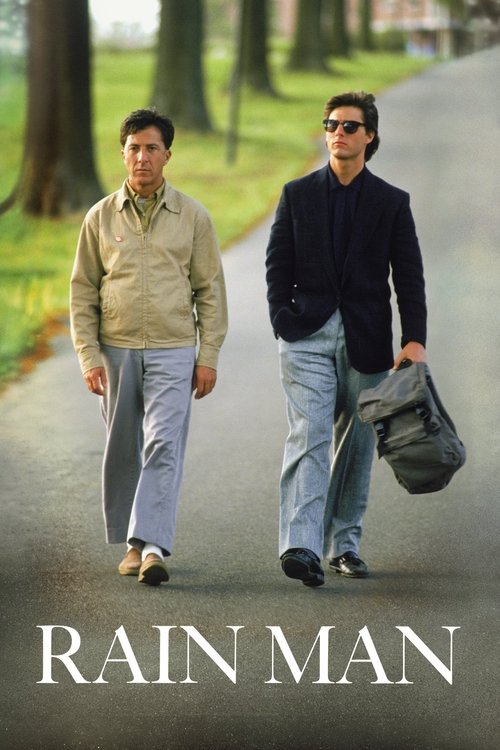
Title: Rain Man
Year: 1988
Director: Barry Levinson
Writer: Barry Morrow
Cast: Dustin Hoffman (Raymond Babbitt),
Tom Cruise (Charlie Babbitt),
Valeria Golino (Susanna),
Gerald R. Molen (Dr. Bruner),
Jack Murdock (John Mooney),
Runtime: 134 min.
Synopsis: When car dealer Charlie Babbitt learns that his estranged father has died, he returns home to Cincinnati, where he discovers that he has a savant older brother named Raymond and that his father's $3 million fortune is being left to the mental institution in which Raymond lives. Motivated by his father's money, Charlie checks Raymond out of the facility in order to return with him to Los Angeles. The brothers' cross-country trip ends up changing both their lives.
Rating: 7.754/10
The Arithmetic of Empathy: Rain Man as a Journey Beyond Numbers
/10
Posted on June 7, 2025
Barry Levinson’s Rain Man (1988) is a film that navigates the delicate line between heart and calculation, a road movie that’s as much about emotional discovery as it is about the collision of two estranged brothers. Anchored by a revelatory performance from Dustin Hoffman and a raw, evolving turn from Tom Cruise, it’s a story that transcends its late-’80s sentimentality to probe the complexities of connection, obligation, and what it means to be human. Levinson crafts a work that’s both intimate and expansive, using America’s open roads to map the terrain of the heart.
Dustin Hoffman’s portrayal of Raymond Babbitt, an autistic savant, is a marvel of precision and humanity. His rhythmic speech, rigid routines, and fleeting moments of vulnerability create a character who’s neither caricature nor saint. Hoffman inhabits Raymond with a meticulousness that feels lived-in, making his savant abilities counting cards, reciting facts secondary to his quiet struggle for agency. Tom Cruise, as Charlie Babbitt, the selfish hustler brother, delivers a performance that evolves from brash entitlement to reluctant tenderness. Their chemistry fractured, then fused carries the film, though Valeria Golino’s Susanna, Charlie’s girlfriend, feels underutilized, a plot device more than a person.
Levinson’s direction is understated yet evocative, letting the brothers’ journey breathe. Cinematographer John Seale captures the American landscape diners, deserts, Vegas neon with a warmth that contrasts the emotional chill of Charlie’s initial greed. The visual restraint avoids melodrama, grounding the fantastical elements of Raymond’s mind in a tactile world. Yet, the film’s pacing can falter, particularly in its Vegas detour, which, while entertaining, feels like a commercial concession that dilutes the emotional core.
The screenplay, by Ronald Bass and Barry Morrow, is a tightrope of humor and pathos. Its dialogue Raymond’s repetitive mantras, Charlie’s exasperated outbursts feels authentic, capturing the friction of misunderstanding. However, the script occasionally leans on clichés, like the redemptive arc of the selfish sibling, and its portrayal of autism, while groundbreaking for its time, simplifies the spectrum’s complexity. Hans Zimmer’s score, with its synth-driven melancholy and twangy guitar, adds a soulful pulse but can feel dated, occasionally nudging the film toward soap opera.
Rain Man stumbles when it prioritizes plot contrivances like the custody battle over deeper exploration of Raymond’s inner world. Yet, its power lies in its refusal to offer easy answers. It’s not about “fixing” Raymond or redeeming Charlie; it’s about the messy, incremental work of understanding. Flawed but deeply affecting, Rain Man is a film that counts not in numbers but in moments of quiet connection, leaving you to ponder the math of love.
0
0
